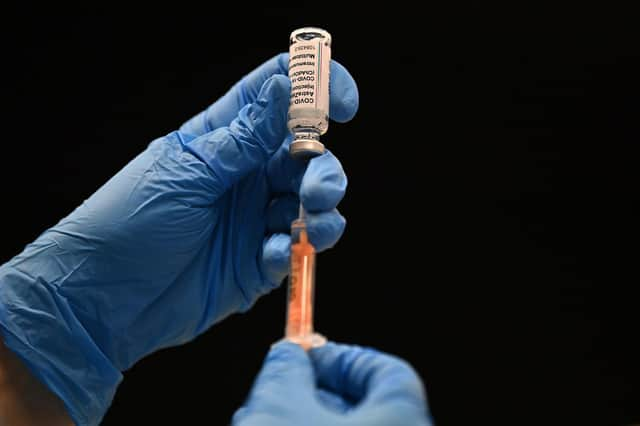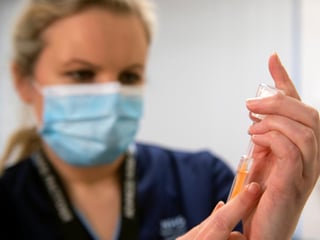Can you spread Covid after having vaccine? New Oxford jab study on virus transmission explained


Three vaccines have been approved for use in the UK, with over 9.6 million people receiving their first dose so far.
The rollout of the Pfizer-BioNTech and Oxford-AstraZeneca vaccines is well underway, with the Moderna jab due to arrive in the country in spring.
Advertisement
Hide AdAdvertisement
Hide AdDespite the vaccination programme’s progress, the impact of the jabs on virus transmission has been largely unknown - until now.
Scientists have said the Oxford vaccine could lead to a “substantial” fall in the spread of Covid-19.
This is the first time a vaccine has been shown to reduce transmission of the virus.
The study also showed that the vaccine remained effective while participants waited for their second dose.
Here’s everything you need to know about the early study.
Can the vaccine slow the virus spread?
The Oxford jab may reduce transmission of coronavirus by 67 per cent.
The study, which is yet to be formally published, measured the impact on transmission by testing participants every week for coronavirus.
Scientists tested for asymptomatic infections, as well as recording when anyone became ill with the virus.
The study, carried out on 17,000 people in the UK, South Africa and Brazil, found that the numbers of participants testing positive halved after people had been given two vaccine doses.
Advertisement
Hide AdAdvertisement
Hide AdThe report said: "The data indicate that [the vaccine] may have a substantial impact on transmission by reducing the number of infected individuals in the population.”
UK Health Secretary Matt Hancock has hailed the findings as “absolutely superb”.
He called the study “hugely encouraging”, adding: “This further reinforces our confidence that vaccines are capable of reducing transmission and protecting people from this awful disease".
How does the vaccine work to reduce the spread?
The health secretary said the study shows that “vaccines are the way out of this pandemic”.
Simply put, if there is no virus present, it can’t be spread from person to person.
If the vaccine stops people from spreading Covid-19, as well as preventing them from becoming severely ill, it will have a bigger impact on the pandemic.
That is because each person who is vaccinated indirectly protects other people.
If a jab only stopped you from becoming really ill, but you could still catch and pass on the virus, everyone would have to be given a vaccine for protection.
Are you protected from the vaccine after one dose?
Advertisement
Hide AdAdvertisement
Hide AdThe UK has adopted a different approach to other countries, aiming to give the first dose of a vaccine to as many people as possible and delaying the second dose for about 12 weeks.
It was hoped that this system would save more lives by giving a larger amount of people at least some protection from coronavirus.
However, the UK has faced international criticism as well as disapproval from the British Medical Association for going down this route.
Yet the new Oxford study showed the vaccine remained effective while people waited for their second jab.
During the three months after the first injection, it was 76 per cent effective.
Protection rose to 82 per cent after the second dose was administered.
Prof Andrew Pollard, chief investigator of the Oxford vaccine trial, said the study’s results supported the UK’s method of delaying the second dose.
He said it “supports the policy recommendation made by the Joint Committee on Vaccination and Immunisation for a 12-week prime-boost interval, as they look for the optimal approach to rollout."
Advertisement
Hide AdAdvertisement
Hide AdProf Stephen Evans, from the London School of Hygiene & Tropical Medicine, added: "The data definitely provide some evidence to suggest that the eventual protection from two doses of this vaccine are not worsened by having a longer than 28 or 42 day period between doses, and tend to confirm what had been shown before, that if anything the eventual efficacy was better."
Does the vaccine work against new variants?
The study was undertaken before the new strains of coronavirus, including the South African variant, emerged in the country.
But Dr Pollard said he was anticipating that the Oxford vaccine would provide “good protection” against the UK variant that first emerged in Kent.
When asked on BBC Radio 4’s Today programme how protective the jab could be against the other variants, Dr Pollard said: "When we look at the new mutations that have been arising in other countries and now also here in the UK - that is the virus trying to escape from human immunity, and that's whether it's from vaccines or from infection.
"I think that's telling us about what's to come, which is a virus that continues to transmit, but hopefully that will be like other coronaviruses that are around us all the time, which cause colds and mild infections.
"We will have built up enough immunity to prevent the other severe disease that we've been seeing over the last year."
Do the other vaccines slow transmission?
The Pfizer and Moderna vaccines have both undergone clinical trials, but these studies did not look for impact on transmission.
However, if the Oxford vaccine can reduce the virus spread, it is likely that the others will be able to, according to experts.
That is because the three vaccines all target the same part of Covid-19.
